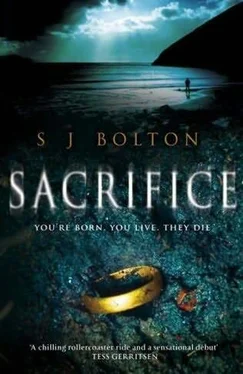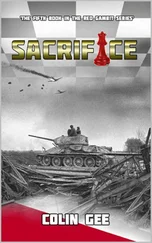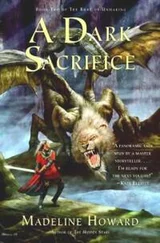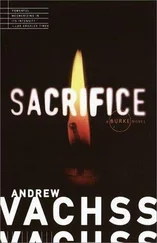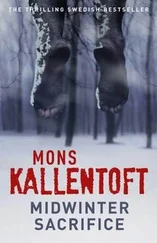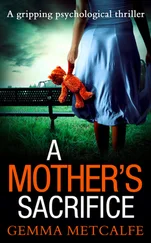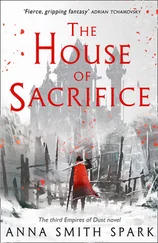S Bolton - Sacrifice
Здесь есть возможность читать онлайн «S Bolton - Sacrifice» весь текст электронной книги совершенно бесплатно (целиком полную версию без сокращений). В некоторых случаях можно слушать аудио, скачать через торрент в формате fb2 и присутствует краткое содержание. Жанр: Триллер, на английском языке. Описание произведения, (предисловие) а так же отзывы посетителей доступны на портале библиотеки ЛибКат.
- Название:Sacrifice
- Автор:
- Жанр:
- Год:неизвестен
- ISBN:нет данных
- Рейтинг книги:5 / 5. Голосов: 1
-
Избранное:Добавить в избранное
- Отзывы:
-
Ваша оценка:
- 100
- 1
- 2
- 3
- 4
- 5
Sacrifice: краткое содержание, описание и аннотация
Предлагаем к чтению аннотацию, описание, краткое содержание или предисловие (зависит от того, что написал сам автор книги «Sacrifice»). Если вы не нашли необходимую информацию о книге — напишите в комментариях, мы постараемся отыскать её.
Sacrifice — читать онлайн бесплатно полную книгу (весь текст) целиком
Ниже представлен текст книги, разбитый по страницам. Система сохранения места последней прочитанной страницы, позволяет с удобством читать онлайн бесплатно книгу «Sacrifice», без необходимости каждый раз заново искать на чём Вы остановились. Поставьте закладку, и сможете в любой момент перейти на страницу, на которой закончили чтение.
Интервал:
Закладка:
'Quite.'
She started crackling again so I told her, without being sure she could hear me, that I would phone her that evening. I carried on into Uyeasound, a scattering of buildings around a small, natural harbour.
I found the coffee shop easily enough. A couple of hikers sat at one of the tables; a man in a business suit at another. That left three tables free. I chose one and sat down. An elderly woman poked her head out of a door at the back of the room, glanced round, didn't appear to notice me and disappeared again. I pulled a biro out of my coat pocket and picked up one of the paper napkins on the table. I started to doodle. And think.
Connor Gair; a fair-skinned, two-year-old boy. Given my own preoccupation with babies, it's hardly surprising that since finding out that the murdered woman had given birth, I'd been wondering what had happened to her baby. Had the baby died too, I'd asked myself many times, or was it alive somewhere, oblivious to what had happened to its mother? Had Dana now found that baby?
Well, if Stephen Gair was bringing up his own son by Melissa but passing him off as the child of his new wife, he had to have been involved in Melissa's death. There was no getting round that one.
'Ye writin to da Trowie folk?'
I jumped. The waitress had returned and was looking down at the napkin. I'd drawn several of the runes I remembered from the standing stone.
'Oh,' I said, 'they're runes. From the standing stone up at Lunda Wick.'
She nodded. 'Aye, da Trowie marks.'
The Shetland dialect can be pretty strong and the locals aren't above exaggerating it a bit to perplex their visitors.
'Sorry, but what's Trowie?'
She grinned at me, showing bad teeth. Her once-fair skin had been burned red by the wind and her hair was like dead straw. She looked about sixty; she could have been anything from forty-five upwards. 'Da Trows,' she said. 'Da grey folk.'
It was a new one on me. 'I thought they were runes. Viking runes.'
She nodded and seemed to lose interest. 'Aye. Dey say dey came fra the Norse lands. What'll I get ye?'
I ordered a sandwich and coffee and she disappeared back into her kitchen. Trow, Trowie? I wrote it down, guessing at the spelling. I'd never heard the word before but it might well be significant. What I'd assumed were Viking runes, she'd called Trowie marks. Who were the Trows? And why would they carve their marks on Melissa's body?
I waited for her to come back but the cafe was filling up. When she brought my order, she plonked it down and turned to another table. I could come back later, when the cafe was quieter, or I could find a library. Now, that was a thought. I had access to the best library on Unst, one that specialized in island folklore and legend. Always assuming I could successfully navigate the librarian. I ate quickly, got up and paid my bill.
I was lucky; Richard was still out and Elspeth only too happy to be left alone all afternoon. By five o'clock, I knew more about the history of Shetland than I'd ever wanted to. I'd learned that Viking warriors had invaded in the eighth century, bringing with them the old pagan religions of Scandinavia. Christianity had arrived two hundred years later, but by that time the Norse pagan beliefs were deep rooted and had clung hard. As had the Nordic culture.
Though geographically closer to the coast of Scotland, the Shetland Isles had been part of a Norse earldom until the late fifteenth century. Even after the islands passed under Scottish rule, the sea continued to insulate them, preserving a whole store of tradition. The dialect was still heavily interspersed with old Norse words, many of which had been adapted and localized. The word Trow being a case in point.
Trow, I discovered, was an island corruption of the Scandinavian word troll. According to legend, when the Vikings had arrived for a spot of rape and pillage, they hadn't come alone – they'd brought the Trows. Most of the early references I found described the Trows as quite endearing creatures, albeit stomach-churningly ugly: cheerful, happy people, who lived in splendid caverns in the ground, were fond of good food, drink and music, but hated churches and anything connected to religion. Humans took care not to offend them on account of their supernatural abilities.
They had powers to charm and hypnotize, and liked to lure away humans, particularly children and pretty young women. They also had the gift of making themselves invisible, especially at night-time and at twilight. Strong sunlight, depending on which version of the stories you read, was either uncomfortable or fatal.
I found stories of Trows stealing into homes at night-time, to sit around the fireside and help themselves to household produce, tools or – their favourite – items fashioned from silver; and of islanders leaving gifts of fresh water and bread out for their Trowie visitors, like children leaving mince pies out for Santa Claus. I learned that Trows were powerless when confronted with iron.
It was all quite harmless, entertaining stuff. Until I got to the Unst versions of the stories. Then things took a decidedly darker turn.
Gletna Kirk, for example, not far from Uyeasound, had never been completed, thanks to the Trows. Any building work done on one day would be found strewn down the next. One night, irritated by the lack of progress, the officiating priest had stayed at the site to watch. He'd been found dead the next morning. His murderer was never found, the building work was abandoned and Trows had copped the blame.
I read that the numerous tiny hillocks around the islands were believed to be Trow graves, the creatures, it seemed, being particular about how they were buried. Trows believed that if their bodies didn't lie in 'sweet, dark earth', their souls would wander and turn malicious. Many Trows were buried together, preferring company, even in death. Even today, it was claimed, an islander, discovering disturbed ground on his land, wouldn't investigate, in case he uncovered a Trowie grave and set loose an evil spirit.
I am not remotely a superstitious person, but as I read that some- thing cold pressed itself against my spine.
Other stories told of women seen out walking in the twilight, at the same time that they died peacefully in their beds at home. I read that whenever the Trows stole an object, they left in its place a perfect replica, known as a stock. When they stole a person, they left a semblance. I looked semblance up in a dictionary of folklore: 'A wraith-like creature,' it said, 'little more than a ghost, but bearing a strong physical resemblance to a human.' Richard's study lay on the eastern side of the house and, this late in the day, no sunlight found its way through the large bay windows. I realized that I was shivering.
In relation to Unst, I found no stories of mischievous, hobbit-like creatures. Instead, there were several brief references to the Kunal Trow, or King Trow: human in appearance but with great strength, unnatural long life and considerable supernatural powers, including that of hypnosis and the ability to make himself invisible.
In one book I looked at the Kunal Trows were described as a race of males, unable to beget female children. To reproduce, the Kunal Trows stole human women, leaving behind semblances in their place. Babies born of these unions were always strong, healthy sons. And yet nine days after giving birth, the mothers died.
I found several references to a book by a Scottish woman, who was generally considered to be the expert on the Unst Kunal Trow. I was sure Richard would have a copy of it but it wasn't anywhere obvious.
Well, it was all very interesting, but it wasn't getting me any closer to interpreting my runes or Trowie marks.
Earlier, I'd found a copy of the same book on runes that Dana had borrowed from Lerwick public library. I picked it up again and opened it at the preface.
Читать дальшеИнтервал:
Закладка:
Похожие книги на «Sacrifice»
Представляем Вашему вниманию похожие книги на «Sacrifice» списком для выбора. Мы отобрали схожую по названию и смыслу литературу в надежде предоставить читателям больше вариантов отыскать новые, интересные, ещё непрочитанные произведения.
Обсуждение, отзывы о книге «Sacrifice» и просто собственные мнения читателей. Оставьте ваши комментарии, напишите, что Вы думаете о произведении, его смысле или главных героях. Укажите что конкретно понравилось, а что нет, и почему Вы так считаете.
